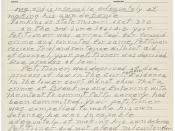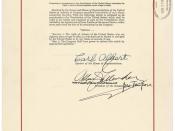Gideon vs. Wainwright
By Andy Coffey
You walk into a court room with a layman's knowledge of the law and are defending yourself on a crime you did not commit. The proceedings to come are to complex for your physique and you are too poor to afford a lawyer. After representing yourself in the court you are found guilty by jury of your peers and charged with sentences that is unfairly fitted with the crime that you are accused of committing. Looking out the barred window, you realize all the freedoms that were unfairly stripped away from you and wonder, what would've happened if you had a lawyer to help you with your case. This is what could have happened to many people if it was not for the Justice Hugo L. Black requiring state courts to appoint attorneys for all individuals accused of crime if they cannot afford one.
In the 1963 landmark decision Gideon v. Wainwright, the U.S. Supreme Court expressed an opinion that had major consequences upon the interpretation of civil liberties and the application of the Bill of Rights to the state government. However the consequences of such decision brought a major change to the interpretation of the constitution, reducing the power of the state constitution limiting the state's power. Throughout this paper, it will show in a detail what had happen in the case between Gideon v. Wainwright. Also getting insight to the Sixth Amendment and the Fourteenth Amendment, the Due Process, which lead to the Justice Hugo L. Black and his court's decision. This paper will also take a look at cases prior to Gideon v. Wainwright. Finally, this paper will take a close look at the consequences and its effect, dealing with the state constitution and the federal constitution and its jurisdiction. The...


